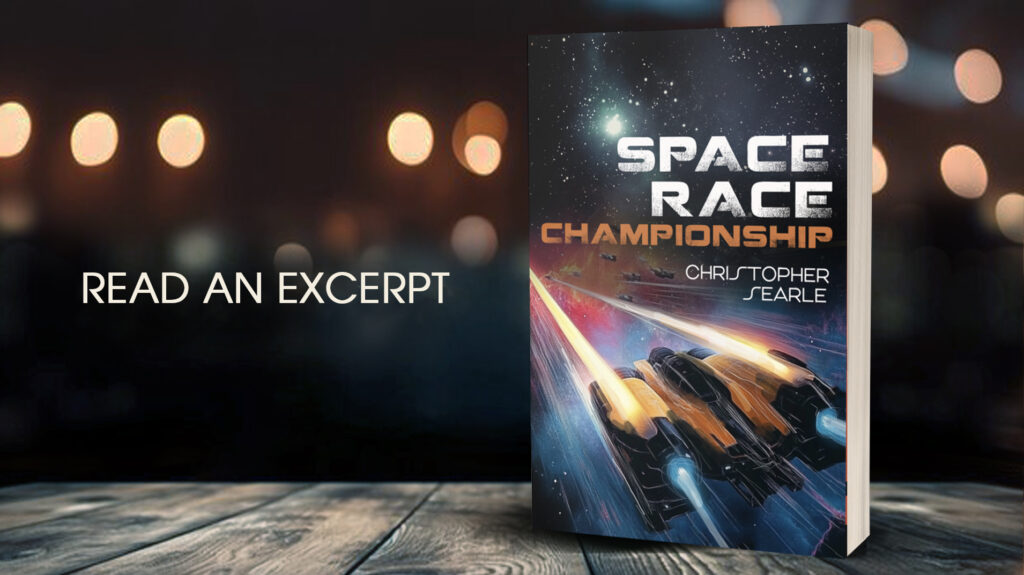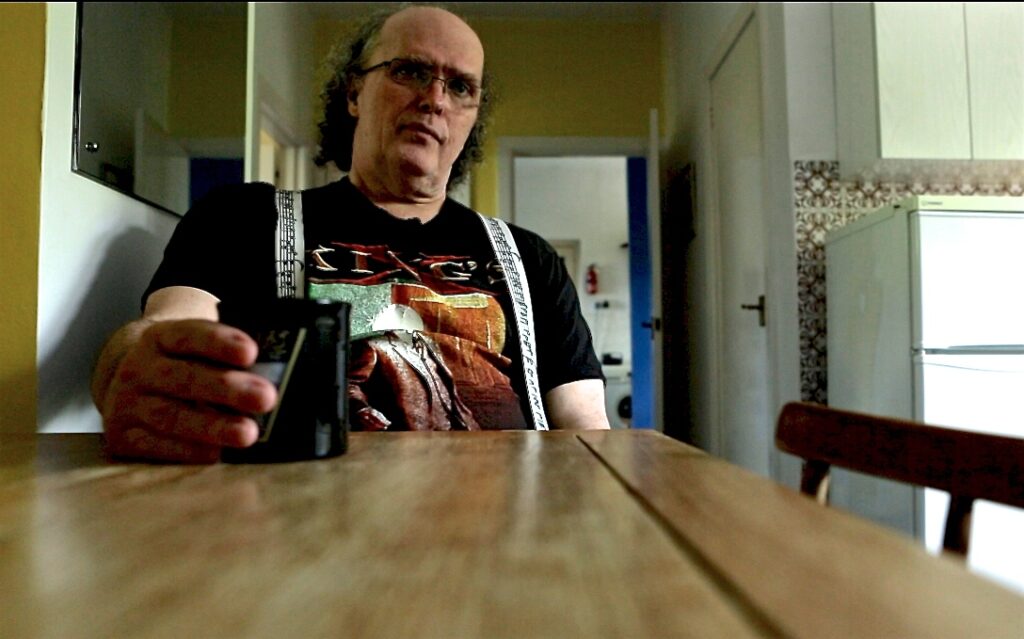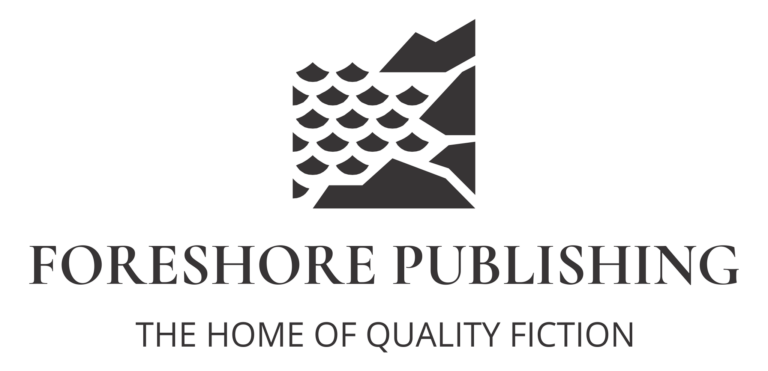
SPACE RACE CHAMPIONSHIP – a unique, out-of-this-world, no-holds-barred sci-fi adventure for Young Adults. Good old-fashioned Formula One of the 90’s BUT IN SPACE! – BOOK CLUB. Chapter 1 – New Competitors “And it’s that season again where we get hyped for the biggest event of the year. The official host of the season is back, so for the next four months of this year you will have me – Pyra Summers – talking you over the Championship and the rumours, stats, and official news that makes itself known. And since I’m back on the airwaves, you can be sure that first piece of news you all look forward to will be coming sometime this week.” Pyra Summers of Radio Racer [15/2-0085] Two spacecraft waited together at the starting line within the cruiser’s hangar bay. The improvised line was nothing more than two mini cruisers parked either side of the two ‘craft. The first ‘craft was a Galaxy model – designation Y/26t. Oblong in shape, it had a rear rectangular section that fit around the control cabin’s viewshield – which was also oblong in shape. The other ‘craft was a Rotablade – designation G/0ld5n. A rectangular shape with rounded corners, it had a tubular rotating blade set either side that were as long as the ‘craft itself. These were auto-defence weaponry emplacements, but were disabled for the moment. This ‘craft also had an oblong shaped viewshield. The two mini cruisers flashed their lights, and the pilots of the ‘craft lifted them up and shot out of the hangar. There was a lot of clutter that the two racers dodged around – the pilot of the Rotablade doing better than that of the Galaxy. Numerous lights marked the way for the racers, and as the ‘craft sped past the lights changed colour. The Rotablade was in danger of smashing straight into the hulk of a damaged mini cruiser, but a quick drop was all that was needed to avoid it. There was the issue of more debris beyond it, but the Rotablade smashed through all of it without a care in the world. When the Galaxy hit this point, it rose above instead of going below, and seemed content to stay above most of the debris. It was forced back into the debris field when one of the sections of a cruiser floated into its path. It tried to dodge around the debris instead of going through it, which caused it to lose some speed. The distance between the two ‘craft had increased. The Rotablade was now within the outer limits of an asteroid field, effortlessly flying through them. After passing a few more, it was out of the field and hugging the plating of a cruiser as it travelled down the length of it. The next light indicated the start of a structure that the racers needed to travel through. It was large, looking as though it was a cruiser in the process of being built. Or at least had been, as it looked abandoned considering the angle of it. The Rotablade flew straight in, being completely aware of the girders that made up the structure. Despite that awareness, it didn’t stop the ‘craft from clipping one of them. The pilot was quick to react and saved it from colliding into a second. The Galaxy had now opened up in speed, having hit the asteroid field. It made it through without hitting any, but there had been a few close calls. Then it was flying the length of the cruiser. The Galaxy had made sure to keep a larger gap between the two than the Rotablade had. When it reached the structure, it slowed down to enter, and kept that speed while traversing through. The Rotablade was almost back to the starting cruiser, following the last few lights that created a winding path back to the hangar it had first started at. It was still paying no mind to the debris scattered around, and was able to bank and turn hard to avoid larger obstacles quickly. It slowed down to enter the hangar at the same time the Galaxy exited the structure of the abandoned cruiser. It took about a minute more for the Galaxy to follow the path and enter the cruiser to land as well. When both had landed, a results screen appeared with the time both had taken to complete the course. “And it’s a victory for the current champion!” a voice rang out. The screens of light dispersed, revealing two boys sitting on chairs with a controller in hand. “Will the current champion be beaten sometime soon?” the other of the two stated. “Tune in next time when we race in about… Five minutes?” “The current champion will not be beaten,” Tom Hughs said. “Not if the competition refuse to push their ‘craft to the max.” “I just don’t feel I can react fast enough,” Lee Johnson responded. “If you are used to the controls and the way something feels, you should be able to react no matter what speed you’re going.” “And I always try.” Lee looked around the room, picturing the race that had just happened. Then he looked back further to the last time he had pushed to near the max. It hadn’t ended well for him. The game was a tie-in to the most popular event of the world they lived. One which happened once every five years. As it turned out, this was the year in which the next was to happen. Lee hadn’t mentioned anything about it yet, but the news had confirmed the selection of the entrants for this year had happened. Within a week, those names would be revealed, and the hype for the event would begin fully. “So, are we getting to a new race?” Tom asked. “Yeah, sure,” Lee replied. “But wouldn’t it be great to be entered into the event for real?” “As much fun as it would be, what chance do we stand without

Robert J. Thomas’s meticulously researched novel The Halibag Boys: A Time To Fly is a gripping account of an RAF crew in northern England aboard the heavy bomber Handley Page Halifax, known as the Halibag, during World War II. The author answers our questions about the novel and how he wrote it. How do you feel about being a published fiction author? Do you consider yourself an historical novelist? Obviously, it’s a pleasure to be published, it’s why we write books to reach a wide audience. A lot of work goes into a novel and to see it in print and on the shelf for sale is an achievement, people spending their money to buy it and hopefully enjoying it an honour. Although historical fiction is my preferred format for novels, I also write general fiction, as well as nonfiction titles. I create what inspires me, I have several projects on the go at any time, which one is worked on today depends on my mood. I find it helps not to be tied to one genre, after finishing a novel I find non-fiction cleansing. The story is told through the eyes of newly qualified flight engineer John Jenkins. How did he and the times you write about in this novel first lodge in your imagination? John, the central character of The Halibag Boys, was a real person, though his name has been changed. He was a direct relative of mine, though I never met him. After the passing of my mother in 2008 I began researching my family tree, not an uncommon activity after losing a parent I’ve since found out. During this research I stumbled across John, though initially just evidence that he once existed. I was aware of him vaguely as I had been told as a child he had served with Bomber Command during World War Two, but all those who could tell me more in later years were gone. Purely by chance, as is often the case, a photograph of John came into my possession. He was standing with a group of men beside an aircraft, this set me down a road that led to opening up his life to me. From this photograph I identified the aircraft, it was a Handley Page Halifax. At this time, like many people, the British bomber of the war was the Lancaster as far as I knew. Having established the Halifax’s identity I was able to determine that John was not in Bomber Command, but was in fact part of the Middle East Command and attached to the Royal Australian Air Force, though a member of the RAF. Armed with this knowledge I set about finding his story, at this time with no intention of using it for a novel. Facebook of all places led me to that eureka moment all researchers dream of, I found the son of John’s pilot. A friendship began that has led to over ten years research into not only John, but the aircraft he and the crew used. As part of this research RAF Riccall came to my attention. At first it was nothing more than an entry on John’s service record. Realising where it was and that I had once lived not thirty minutes from it without knowing of its existence, I began to research RAF Riccall as well. More years of work followed, including many visits to what remains of the station today. It had been my intention to write a history of RAF Riccall as a non-fiction book, I had already completed one on John’s Halifax, the one in the photograph. I wrote instead John’s biography, a humongous book covering everything I knew of his life, which by then was quite substantial. John’s story I thought was complete. As with many things that change your life, one day a lightbulb went off in my head fictionalise John’s story. I thought it was an excellent way to tell it, and make something a wider audience would want to read, non-fiction being rather limited to those only interested in its subject, I believe. Where to start I pondered, his beginning wasn’t anything special, but his war record was. As a big kid at heart, I love all things World War Two and over the years become quite an authority on the Halifax and the squadrons John served with. I like Riccall village and made friends there, I knew the former station well and had become quite an authority on it, it all fell into place. Everything I needed I already had, volumes of books, hundreds of documents, maps, all the research I needed to write an historical novel based at RAF Riccall was in my office and my head. Laying in bed one night, unable to sleep, the opening paragraph entered my head and The Halibag Boys: Time to Fly was born. What place does research have in your writing? When does the fiction take over from the facts? Research is of paramount importance. If I can’t find what I need for a book and prove it, I will leave it out rather than make something up. I like my locations to be real, either still or have existed. I tend to change the names of town, streets, buildings etc but always base them on maps or images I have. In Halibag Boys when the lads are walking through RAF Riccall each step is planned against the real RAF station and plotted on the station map I have. Buildings are where they should be and for the purpose they were used in reality. I want the reader to walk through the station with them, as I did when I wrote it. Fiction, for me, takes over for the interaction between people, and sometimes to abridge events that actually took place to suit the story. As an example, in the book my heroes nearly get hit by a piece of debris flying of a broken propeller on a taxiing Halifax. This

N.C. Fortune lives in the Cotswolds. He is a poet and former musician, playing the drums in bands. His first novel Falling Story is a supernatural coming of age ghost story about a girl who went missing in a Gloucestershire village in the 1980s. James Baxter, author of Samuel Beckett’s Legacies in American Fiction, wrote that Falling Story is “an artfully constructed and emotional ghost story and folk horror” with the potential to achieve enthusiasm among horror fans, as well as “high-concept horror cinema” appeal – The Blair Witch Project meets Paul Auster. What attracts you to the genre of horror? My Grandfather and uncle used to tell me ghost stories as a young boy and this in turn attracted me to the horror genre. I get the impression that you’ve been writing most of your life, what were your early influences? I’ve been writing in some form since my early teens and a main early influence on me was the writings of J.R.R. Tolkien.Was it always going to be horror? No. I tried to incorporate aspects of mystery and the supernatural into my novel as well as horror. I was keen to avoid horror cliches which could have greatly detracted from the impact of the story. The novel’s central location of Prestbury, Gloucestershire provides a vivid backdrop to the story (there are historical claims of the area being amongst the most haunted in England). Have you any real life experience of ghosts? Yes several. One such incident was when one night whilst stargazing, i saw a luminous patch of light form in the field next to my garden and slowly drift across it before then dissipating. I live close to Prestbury have extensively researched the ghost stories attached to the village and the surrounding area. What is your writing process? After an initial concept for a poem or story, I try to collate ideas from various sources then try and pull them together to form a cohesive piece. The first thing that strikes me about your writing is that it’s very filmic. How did you arrive at this point, and are there influences from movies feeding into that? The filmic aspects of my story developed over time and were as a result of different plot strands coming together. Film wise though I loved the Hammer horror films of the 1970’s and other classic horror films such as The Exorcist and The Fog and I’m sure these helped shape my story in some aspects. How do you manage to navigate what has already been done before in the genre? You are working in a field where so many of these images have been so well-trodden. I try to be true to the story and avoid sticking to one genre. I find this lends itself to originality and lessens the chances of falling into the traps of horror cliche. Who have you been reading lately? I have recently been reading a biography of the Welsh poet Dylan Thomas. Name a book that made you want to write. The Lord of the Rings by J.R.R. Tolkien. Falling Story by N.C. Fortune is published in the Autumn by Foreshore. N.C. Fortune was born in Streetly, Staffordshire, with the congenital condition Spina Bifida. He moved to the Cheltenham area in 1978 and on his twelfth birthday was given a drum kit, which led to him becoming obsessed with drumming and music. He spent his teens through to his early forties playing the drums in bands, often professionally, only stopping when his disability worsened. His grandfather first told him stories of the paranormal which both scared and intrigued him, and in the 1980s he had a ghostly experience which further developed his fascination. Around this time, he visited Prinknash Abbey near Cheltenham and in the café bookshop found a copy of a book called Mister God, This Is Anna by Fynn which served as one of the inspirations behind Falling Story. N.C. Fortune is a poet and lives on his own in the Cotswolds. ORDER YOUR COPY James Baxter, author of Samuel Beckett’s Legacies in American Fiction, wrote that Falling Story is “an artfully constructed and emotional ghost story and folk horror” with the potential to achieve enthusiasm among horror fans, as well as “high-concept horror cinema” appeal – The Blair Witch Project meets Paul Auster. Smart but troubled, Jo has a secret – she can see ghosts; and after opening the family grimoire, she finds herself at the centre of an intoxicating occult ritual. Falling Story is a supernatural coming of age ghost story about a girl who went missing in a Gloucestershire village in the 1980s: M.R. James for a new generation. Add to Cart



